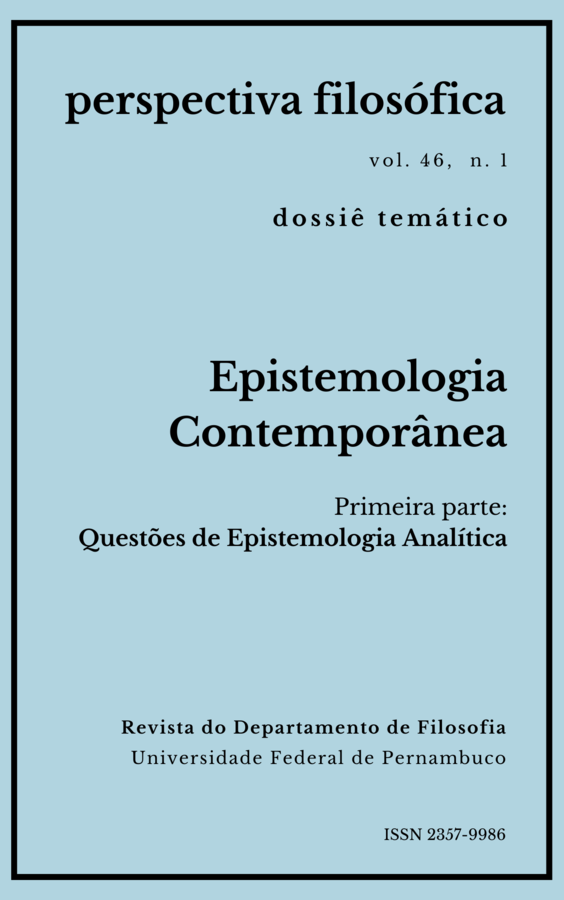O argumento do conhecimento: uma nova estratégia fisicista
DOI:
https://doi.org/10.51359/2357-9986.2019.247941Keywords:
knowledge argument, phenomenal concept strategy, nonconceptual contentsAbstract
This article presents an alternative defense of type B materialism in Jackson's knowledge Argument. To start with, I argue that on her release, Mary newly acquired content is essentially non-conceptual in the light of all available criteria. Mary's acquisition of such content is precisely what allows us to explain both her epistemic progress and the increase of her expertise regarding her old concept PHENOMENAL RED. Yet, while the acquisition of such non-conceptual content is indispensable, it is still insufficient to explain Mary's epistemic progress. Conceptual contents are required. Now, assuming that concepts are mental files, Mary’s newly acquired non-conceptual content of RED must be “digitalized” in order to be stored in the correspondent mental file PHENOMENAL RED. It is based on this concept, now phenomenally enriched by the newly acquired non-conceptual contents, that Mary becomes able to pick out the phenomenal character of her new visual experience of the color introspectively.
References
ALTER, Torin. Social externalism and the knowledge argument.Mind, v.122, n. 486, p. 481-496, 2013.
BACH, Kent. Thought and reference. 1987.
BLOCK, Ned. Max Black’s objection to mind-body identity.Oxford studiesin metaphysics, v. 3, p. 3-78, 2006.
BLOCK, Ned; STALNAKER, Robert. Conceptual analysis, dualism, andthe explanatory gap.The Philosophical Review, v. 108, n. 1, p. 1-46, 1999.
BURGE, Tyler. Individualism and the Mental.Midwest studies inphilosophy, v. 4, n. 1, p. 73-121, 1979.
BURGE, Tyler; HAHN, Martin; RAMBERG, Bjørn T. (Ed.).Reflectionsand replies: Essays on the philosophy of Tyler Burge. MIT press, 2003.
CARRUTHERS, Peter. Phenomenal concepts and higher order‐experiences.Philosophy and Phenomenological Research, v. 68, n. 2, p.316-336, 2004.
CHALMERS, David J.The character of consciousness. Oxford: OxfordUniversity Press, 2010.
DRETSKE, Fred I. Seeing and knowing. Chicago: University of ChicagoPress. 1969.DRETSKE, Fred I.Naturalizing the mind. Cambridge, MA: MIT Press,1997.
DRETSKE, Fred. Knowledge and the Flow of Information. Cambridge,MA: MIT Press, 1981.
EVANS, Gareth. The Varieties of Reference. Oxford: Oxford UniversityPress, 1982.
HILL, Christopher S. Imaginability, conceivability, possibility and the mind-body problem.Philosophical Studies: An International Journal forPhilosophy in the Analytic Tradition, v. 87, n. 1, p. 61-85, 1997.
HORGAN, Terence. Jackson on physical information and qualia.ThePhilosophical Quarterly (1950-), v. 34, n. 135, p. 147-152, 1984.
ISMAEL, Jenann. Science and the phenomenal.Philosophy of Science, v.66, n. 3, p. 351-369, 1999.
JACKSON, Frank. Epiphenomenal qualia.The Philosophical Quarterly(1950-), v. 32, n. 127, p. 127-136, 1982.
LEVINE, Joseph. eight Phenomenal Concepts and the Materialist Constraint.Phenomenal concepts and phenomenal knowledge: New essayson consciousness and physicalism, p. 145, 2006.
LEVINE, Joseph. Materialism and qualia: The explanatory gap.Pacificphilosophical quarterly, v. 64, n. 4, p. 354-361, 1983.LEVINE, Joseph.Purple haze: The puzzle of consciousness. Oxford:Oxford University Press, 2001.
LOAR, Brian. Phenomenal States. Philosophical Perspectives. v. 4, p. 81-108. 1990.
LUPYAN, Gary. Cognitive penetrability of perception in the age ofprediction: Predictive systems are penetrable systems.Review of philosophyand psychology, v. 6, n. 4, p. 547-569, 2015.
NAGEL, Thomas. What is it like to be a bat?.The philosophical review, v.83, n. 4, p. 435-450, 1974.
NIDA-RÜMELIN, Martine; O CONAILL, Donnchadh. Qualia: Theknowledge argument. 2002.
O'DEA, John. The indexical nature of sensory concepts.PhilosophicalPapers, v. 31, n. 2, p. 169-181, 2002.
PAPINEAU, D. Phenomenal and perceptual concepts and the materialistconstraint.In: ALTER, T.; S. WALTER (Eds.). Phenomenal concepts andphenomenal knowledge: New essays on consciousness and physicalism, p.111-144, 2006.
PAPINEAU, David.Thinking about consciousness. Oxford: ClarendonPress, 2002.
PERRY, John. Knowledge, Possibility and Consciousness: The 1999 JeanNicod Lectures. Cambridge, MA: MIT Press, 2001.
PYLYSHYN, Zenon. Is vision continuous with cognition?: The case forcognitive impenetrability of visual perception.Behavioral and brainsciences, v. 22, n. 3, p. 341-365, 1999.
REY, Georges. A narrow representationalist account of qualitativeexperience.Philosophical perspectives, v. 12, p. 435-457, 1998.
STOLJAR, Daniel. Physicalism and phenomenal concepts.Mind &language, v. 20, n. 5, p. 469-494, 2005.
STURGEON, Scott. The epistemic view of subjectivity.The Journal ofPhilosophy,v. 91, n. 5, p. 221-235, 1994.
TYE, Michael. A theory of phenomenal concepts.Royal institute ofPhilosophy Supplements, v. 53, p. 91-105, 2003.
TYE, Michael. Consciousness Revisited: Materialism without PhenomenalConcepts. Cambridge, MA: MIT Press. 2009.
TYE, Michael. Knowing what it is like: The ability hypothesis and theknowledge argument.in Tye, M.,Consciousness, Color, and Content,Cambridge, MA: MIT Press, 2000.
TYE, Michael.Ten problems of consciousness: A representational theory ofthe phenomenal mind. Cambridge, MA: MIT Press, 1995.
Downloads
Published
Issue
Section
License
A Revista Perspectiva Filosófica orienta seus procedimentos de gestão de artigos conforme as diretrizes básicas formuladas pelo Conselho Nacional de Desenvolvimento Científico e Tecnológico (CNPq). http://www.cnpq.br/web/guest/diretrizesAutores que publicam nesta revista concordam com os seguintes termos:
Os autores mantém os direitos autorais e concedem à revista o direito de primeira publicação, sendo o trabalho simultaneamente licenciado sob https://creativecommons.org/licenses/by/4.0/deed.pt_BR que permite o compartilhamento do trabalho com reconhecimento da autoria e publicação inicial nesta revista.
Os autores têm autorização para assumir contratos adicionais separadamente, para distribuição não-exclusiva da versão do trabalho publicada nesta revista, com reconhecimento de autoria e publicação inicial nesta revista (Consultar http://opcit.eprints.org/oacitation-biblio.html).

Esta revista está licenciada com uma Licença Creative Commons Atribuição 4.0 Internacional.













